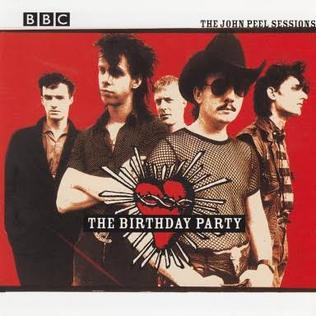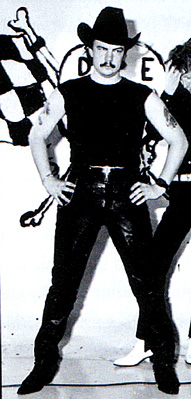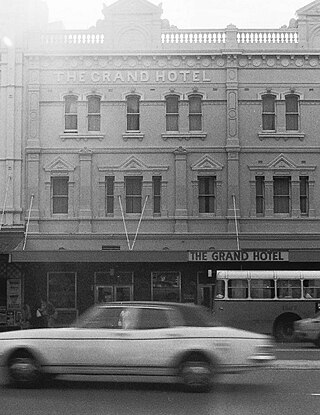Related Research Articles

The Birthday Party were an Australian post-punk band, active from 1977 to 1983. The group's "bleak and noisy soundscapes," which drew irreverently on blues, free jazz, and rockabilly, provided the setting for vocalist Nick Cave's disturbing tales of violence and perversion. Their 1981 single "Release the Bats" was particularly influential on the emerging gothic scene. Despite limited commercial success, The Birthday Party's influence has been far-reaching, and they have been called "one of the darkest and most challenging post-punk groups to emerge in the early '80s."
Shivers may refer to:
Whirlywirld were an Australian post-punk band led by Ollie Olsen in the late 1970s and early 1980s, and the first of his musical collaborations with drummer John Murphy. They played in Melbourne and Sydney and were supporters of the Melbourne little band scene.
Ollie Olsen is an Australian multi-instrumentalist, composer and sound designer. He has performed, recorded and produced rock, electronic and experimental music since the mid-1970s. His post punk groups included Whirlywirld (1978–80), Orchestra of Skin and Bone (1984–86) and No (1987–89). Olsen joined with Michael Hutchence to form a short-term band, Max Q, which issued an album in 1989. He co-founded the alternative electronic music record label Psy-Harmonics with Andrew Till in 1993. In 2014 he formed Taipan Tiger Girls.

The Little Band scene was an experimental post-punk scene which flourished in Melbourne, Victoria, Australia from late 1978 until early 1981. Instigated by groups Primitive Calculators and Whirlywhirld, this scene was concentrated in the inner suburbs of Fitzroy and St Kilda, and involved large numbers of short-lived bands, more concerned with artistic expression than commercial success. Frequently changing names, swapping members and sharing equipment, the bands played in small inner-city venues, often pubs, and their music was recorded live and broadcast by radio announcer Alan Bamford on community station 3RRR. In the scene, the distinctions between performers and audience were blurred; many audience members were either in little bands or ended up forming such.

Michael John Harvey is an Australian musician, singer-songwriter, composer, arranger and record producer. A multi-instrumentalist, he is best known for his long-term collaborations with Nick Cave, with whom he formed The Boys Next Door, The Birthday Party and Nick Cave and the Bad Seeds.

Rowland Stuart Howard was an Australian rock musician, guitarist and songwriter, best known for his work with the post-punk group The Birthday Party and his subsequent solo career.
Laughing Clowns, sometimes written as The Laughing Clowns, were a post-punk band formed in Sydney in 1979. In five years, the band released three LPs, three EPs, and various singles and compilations. Laughing Clowns' sound is free jazz, bluegrass and krautrock influenced. The band formed to accommodate Ed Kuepper's growing interest in expanding brass-driven elements he had brought to The Saints' third album, Prehistoric Sounds, and by adopting flattened fifth notes in a rock and roll setting while using a modern jazz styled band line-up.
Marie Hoy is an Australian musician and actress. As a vocalist and keyboardist, she was a member of Sacred Cowboys, Orchestra of Skin and Bone (1984–86), No (1987–89) and a number of bands in Melbourne's little band scene. As an actor, she appeared in the 1986 film Dogs in Space, where she performed the Boys Next Door's track, "Shivers". She worked with performance artist, Stelarc, on a short science fiction film, Otherzone (1998).

Tracy Franklin Pew was an Australian musician, and bassist for The Birthday Party. He was later a member of The Saints, and worked with Nick Cave and the Bad Seeds.
Australian musicians played and recorded some of the earliest punk rock, led by The Saints who released their first single in 1976. Subgenres or offshoots of punk music, such as local hardcore acts, still have a strong cult following throughout Australia today.

Door, Door is the debut album by Australian rock band The Boys Next Door. The album was recorded before the band left Australia for London in 1980, at which point they changed their name to The Birthday Party and created the body of work for which they are most recognised. Likewise, the album is different stylistically from their later work, being less dark and slightly more poppy.
Hee Haw is the second release and first EP by the Australian post-punk band the Boys Next Door. The Hee Haw EP was released in 1979 by the independent label, Missing Link Records.
Voigt/465 were an Australian post-punk band based in Sydney, Australia. They were a feature of the Sydney inner-city music-scene during the late 1970s and their music was critically acclaimed. Their sound was influenced by Krautrock and has been described by a band-member as an "unsettling mixture of song-driven rock elements and free-noise experimentation". Voigt/465 recorded an album, Slights Unspoken, before they disbanded in late 1979. With their self-funded recordings and determinedly uncompromising music Voigt/465 epitomised the do-it-yourself ethic of the alternative music scene of the late 1970s.

The Grand Hotel was a pub located at Broadway, Railway Square, in the suburb of Haymarket, Sydney in the state of New South Wales, Australia.

Dogs in Space is a 1986 Australian film set in Melbourne's "Little Band" post-punk music scene in 1978. It was directed by Richard Lowenstein and starred Michael Hutchence as Sam, the drug-addled frontman of the fictitious band from which the film takes its name.

"Shivers" is a song by the Australian post-punk band the Boys Next Door, who would later become the Birthday Party. It is the tenth and final track from the band's debut studio album Door, Door, released in 1979 on Mushroom Records. It was released as the album's only single in May 1979, backed with the B-side "Dive Position".
Fast Forward was a cassette magazine documenting post-punk music in the early 1980s. It was edited in Melbourne, Australia, by Bruce Milne and Andrew Maine, with graphic design by Michael Trudgeon. The cassettes interspersed interviews with music and were packaged with printed artwork and distributed in record shops around Australia and abroad. Thirteen issues were produced between November 1980 and October 1982.
Bruce Milne is a prominent figure in the Australian music industry, a long-standing member of the grass-roots Melbourne music community who, after getting his start publishing a punk fanzine in the late 1970s, has done practically everything since – been a writer, radio presenter, DJ, run record shops, book shops and record labels, run bars and venues, and worked in A&R and as a tour promoter.
Janine Margaret Hall was a New Zealand-born musician who played in early punk and rock groups in Australia. On bass guitar she was a member of Young Charlatans (1977–1978), the Saints and Weddings Parties Anything (1986–1987). After her music career she practised as a naturopath.
References
- ↑ "Young Charlatans". Fast Forward (4). April 1981.
- 1 2 3 Robert), Johnston, Ian (Ian (1995). Bad seed : the biography of Nick Cave. Little, Brown. ISBN 0-349-10778-5. OCLC 829300776.
{{cite book}}: CS1 maint: multiple names: authors list (link) - 1 2 3 Walker, Clinton (2005). Inner city sound : punk and post-punk in Australia, 1976-1985. Verse Chorus Press. ISBN 1-891241-18-4. OCLC 1001828822.
- ↑ Trouchon, Mike (1992). "Rowland S. Howard". Your Flesh (25).
- 1 2 McFarlane, Ian. The encyclopedia of Australian rock and pop. ISBN 978-0-9953856-0-3. OCLC 972477458.
- ↑ Simmonds, Jeremy. The encyclopedia of dead rock stars : heroin, handguns, and ham sandwiches. ISBN 978-1-61374-478-9. OCLC 793575544.
- 1 2 "Outta The Black & Into The Ether // Articles // Mess+Noise - January 22, 2010". rowland-s-howard.com. Retrieved 2023-05-01.
- ↑ "From The Archives -The Young Charlatans- Chronology". www.fromthearchives.org. Retrieved 2023-05-01.
- 1 2 Welberry, Karen. Dalziell, Tanya. Cultural seeds : essays on the work of Nick Cave. ISBN 978-0-7546-6395-9. OCLC 1101101617.
{{cite book}}: CS1 maint: multiple names: authors list (link) - ↑ Walker, Clinton (27 July 2020). "PULP FIVE FOUND!". Clinton Walker. Retrieved 2023-05-01.
- ↑ "Cassette magazine titled 'Fast Forward', number 4, April 1981". RMIT Design Archives Collection. Retrieved 2023-05-01.
- ↑ Kanoniuk, Lachlan (22 Nov 2017). "An oral history of Melbourne punk". Red Bull. Retrieved 2023-05-01.
- ↑ Nichols, David. Dig : Australian rock and pop music 1960-85. ISBN 978-1-891241-26-0. OCLC 922220405.